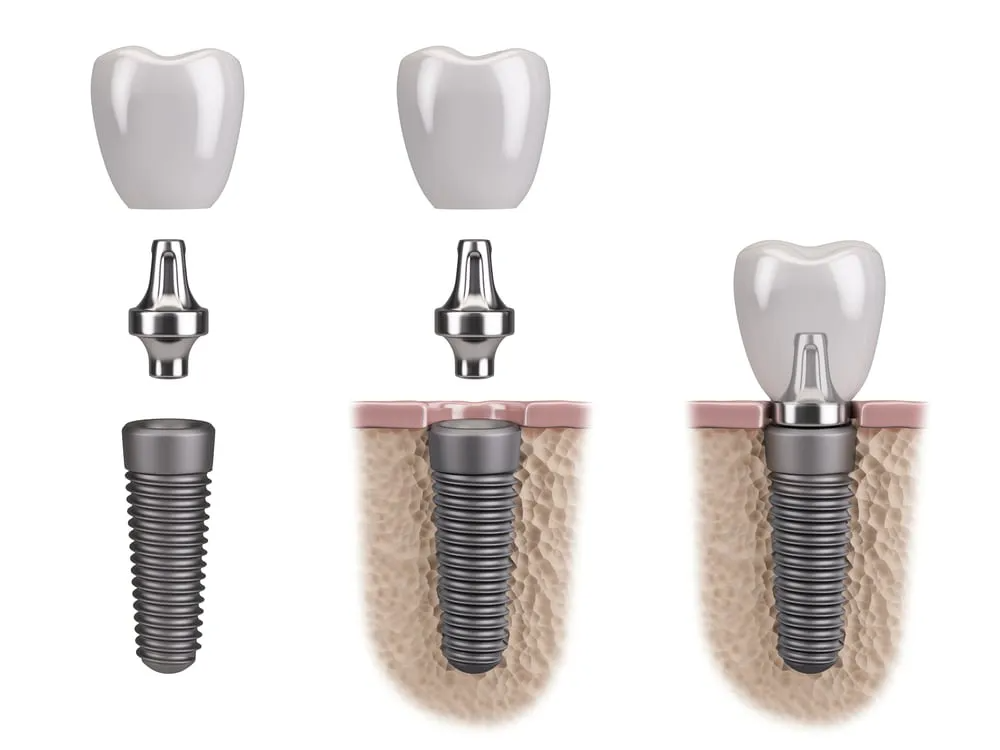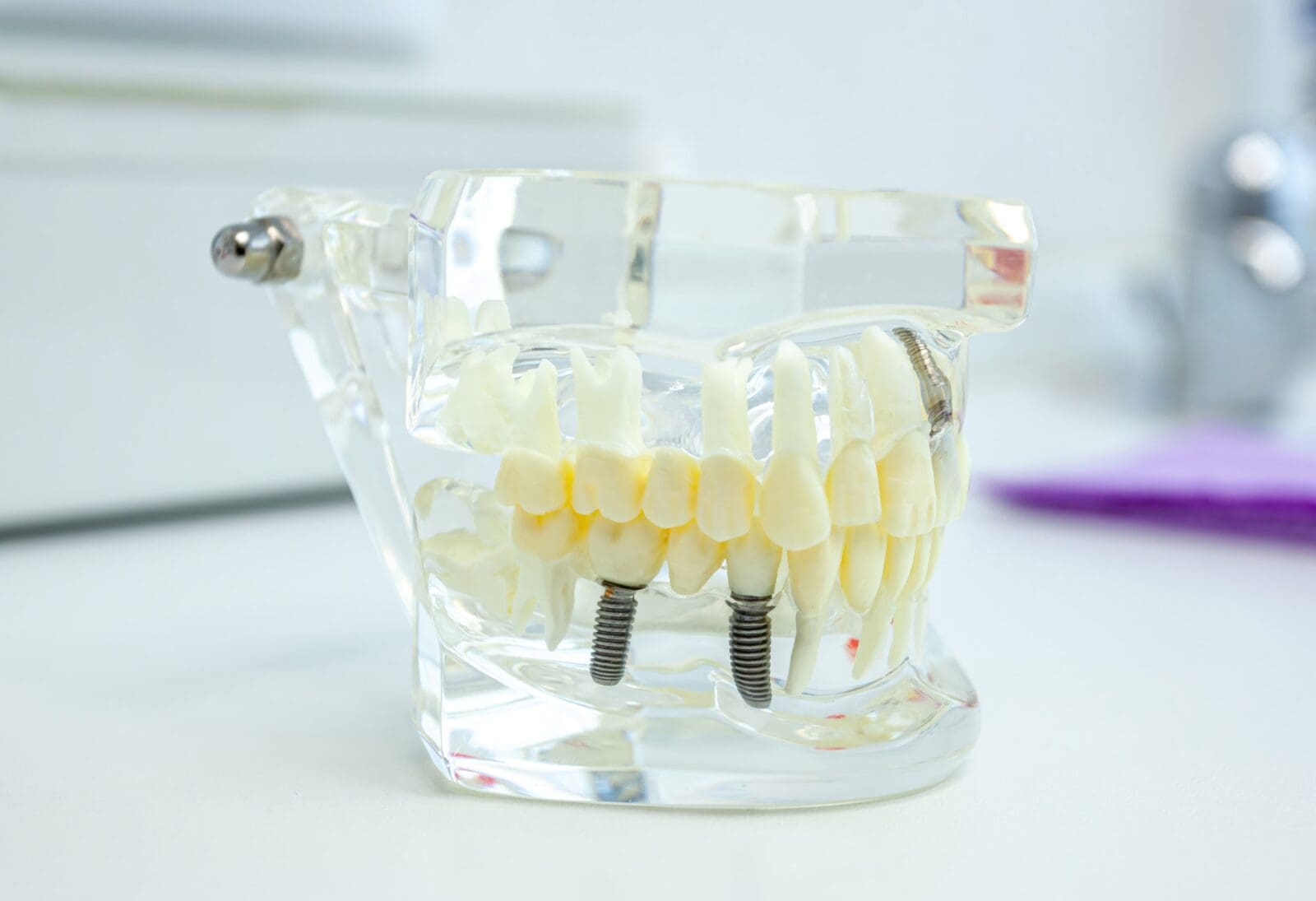Get clear, honest answers to all your questions about dental implants.
Understanding Dental Implants
What are dental implants?
Dental implants are small titanium posts that replace the roots of your missing teeth. When inserted into the jawbone, they integrate with the bone to provide a solid base for crowns, bridges, or full-arch restorations. They look, feel, and function like natural teeth, and help preserve your jawbone and smile long-term.
What are All-on-X dental implants?
All-on-X is a full-arch implant system that replaces all of your upper or lower teeth using just four to six implants. It’s designed for patients who need a complete smile restoration, and in many cases, it can provide teeth in one day with a same-day temporary bridge.
This solution is fixed, secure, and looks completely natural. All-on-X is especially helpful for patients with bone loss, offering long-term results without the need for traditional dentures or extensive grafting.
What are zygomatic dental implants?
Zygomatic implants are a specialized type of dental implant used when there isn’t enough bone in the upper jaw for traditional implants. Instead of anchoring into the jawbone, they’re placed into the cheekbone (zygoma), which is denser and provides strong support. They’re ideal for patients with severe bone loss who want to avoid bone grafting and still qualify for full-arch implant solutions.
Are dental implants safe?
Yes, dental implants are regarded as a very safe option. They’re made from biocompatible materials (like titanium) that naturally bond with your jawbone. When placed by an experienced provider, complications are rare, and long-term success is high.
How long have dental implants been used?
Dental implants have been successfully used for over five decades. Modern dental technology and surgical methods have made implants more dependable, comfortable, and natural-looking than ever before.
What is the success rate for dental implants?
Dental implants have a success rate of 97% to 98% when placed correctly and maintained with good oral hygiene. That makes them one of the most predictable and durable options in modern dentistry.

What to Expect During the Procedure
Is the dental implant procedure painful?
No, most patients are surprised by how comfortable the procedure is. This procedure can be done under oral sedation or IV sedation. Afterward, some mild soreness is normal and usually manageable with over-the-counter medication.
Will I be without teeth after the procedure?
No, you won’t be left without teeth. In most cases, we place a temporary tooth or restoration so you can speak and smile confidently while your implant heals beneath the surface.
Are dental implants as strong as natural teeth?
Absolutely, dental implants are designed to function like natural teeth, and in many cases, they’re even stronger. They restore almost all your natural chewing power and don’t shift or loosen like dentures can.
Candidacy and Considerations
Is there an age limit for dental implants?
No, there’s no strict age limit. Most healthy adults can receive implants, regardless of their age, whether in their 30s, 60s, or even 80s. We do need to wait until jaw growth is complete, so dental implants aren’t recommended for children or teens.
Who is a good candidate for dental implants?
You’re most likely a good candidate if you’re missing one or more teeth, have healthy gums, and enough jawbone to support an implant. Even if you’ve been told you’re not a candidate in the past, treatments like bone grafting may make implants possible.
What are the advantages of dental implants?
Dental implants look, feel, and function like real teeth. They help preserve your jawbone, prevent surrounding teeth from shifting, and eliminate the need for removable appliances.
What are the disadvantages of dental implants?
While dental implants are highly effective, they do involve surgery and healing time. Cost can be a factor; however, most insurance plans now cover implants, making them more accessible than ever. Rarely, complications like infection or implant failure may occur, but these can often be resolved with proper care and follow-up.
Living With Implants
Will my dental implants need special care?
No, implants don’t require special tools or products. You care for them like natural teeth, brush twice daily, floss, and regularly see your dentist. Consistent hygiene is the key to long-term success.
How do I care for my dental implants?
Use a soft-bristled toothbrush and non-abrasive toothpaste. Floss daily, or use a water flosser if preferred. Avoid smoking and keep up with professional cleanings every 3–6 months to prevent complications like gum inflammation or bone loss.

Implant Alternatives and Options
Can dentures be turned into implants?
No, dentures themselves can’t be converted into implants. However, you can replace removable dentures with implant-supported options that offer more comfort and stability, like All-on-X full-arch restorations.
Are dental implants removable like dentures?
No, dental implants are fixed in your jawbone. They stay permanently in place and function like natural tooth roots. The prosthetic teeth they support can be fixed or removable, depending on the treatment plan.
How do implants help if I already wear dentures?
Implants can anchor your dentures to eliminate slipping, improve chewing, and restore confidence. If you qualify, we can replace your dentures entirely with fixed implant-supported bridges for a more natural feel.
Can I get metal-free dental implants?
Yes, metal-free implants made from zirconia are available. While not as common as titanium, they can be a good alternative for patients with metal sensitivities or who prefer a non-metal option.
Cost and Value
How much do dental implants cost?
The cost of dental implants varies depending on your needs. Factors include how many teeth you’re replacing, whether you need bone grafting, and the type of restoration used. At our Frederick, MD practice:
- A single implant typically starts at a competitive rate based on clinical needs
- Full-arch solutions like All-on-X average around $25,000 for direct patients
Dental implants are a long-lasting solution and can often be more budget-friendly over time compared to dentures or bridges. To make treatment more accessible, we also provide flexible financing options.
